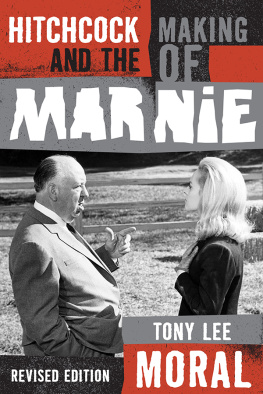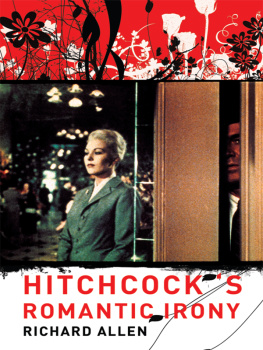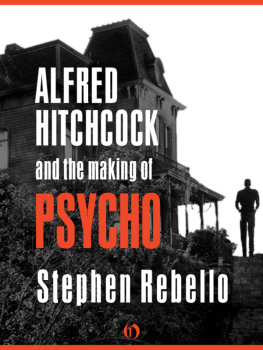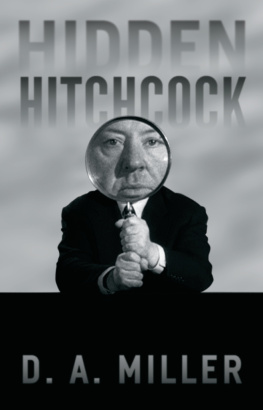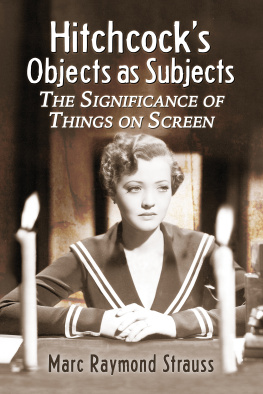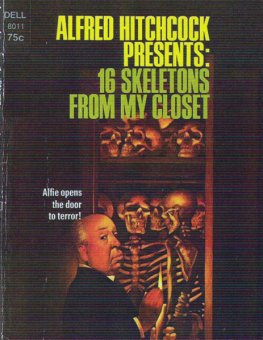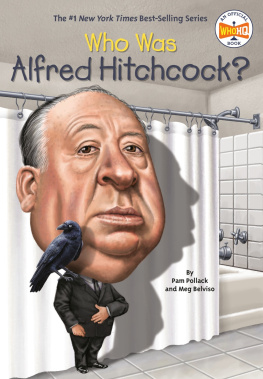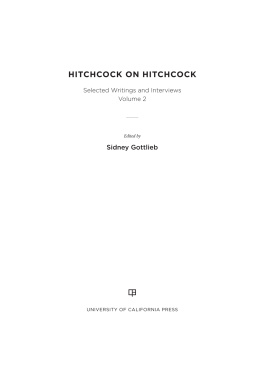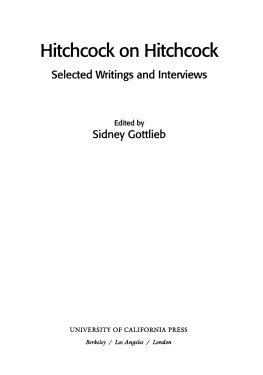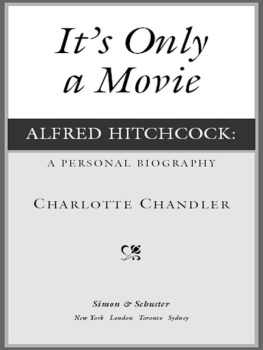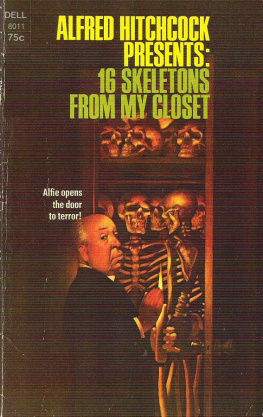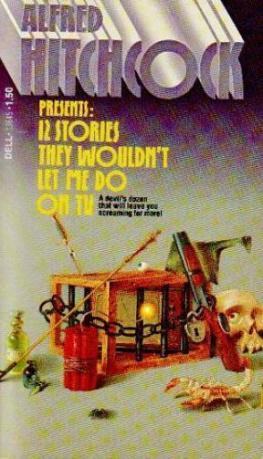Hitchcock Alfred - Hitchcock and the Making of Marnie
Here you can read online Hitchcock Alfred - Hitchcock and the Making of Marnie full text of the book (entire story) in english for free. Download pdf and epub, get meaning, cover and reviews about this ebook. City: Lanham, year: 2013, publisher: Scarecrow Press, genre: Non-fiction. Description of the work, (preface) as well as reviews are available. Best literature library LitArk.com created for fans of good reading and offers a wide selection of genres:
Romance novel
Science fiction
Adventure
Detective
Science
History
Home and family
Prose
Art
Politics
Computer
Non-fiction
Religion
Business
Children
Humor
Choose a favorite category and find really read worthwhile books. Enjoy immersion in the world of imagination, feel the emotions of the characters or learn something new for yourself, make an fascinating discovery.
- Book:Hitchcock and the Making of Marnie
- Author:
- Publisher:Scarecrow Press
- Genre:
- Year:2013
- City:Lanham
- Rating:4 / 5
- Favourites:Add to favourites
- Your mark:
- 80
- 1
- 2
- 3
- 4
- 5
Hitchcock and the Making of Marnie: summary, description and annotation
We offer to read an annotation, description, summary or preface (depends on what the author of the book "Hitchcock and the Making of Marnie" wrote himself). If you haven't found the necessary information about the book — write in the comments, we will try to find it.
Hitchcock and the Making of Marnie — read online for free the complete book (whole text) full work
Below is the text of the book, divided by pages. System saving the place of the last page read, allows you to conveniently read the book "Hitchcock and the Making of Marnie" online for free, without having to search again every time where you left off. Put a bookmark, and you can go to the page where you finished reading at any time.
Font size:
Interval:
Bookmark:
Hitchcock and the Making of Marnie
Revised Edition
Tony Lee Moral
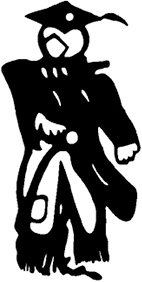
THE SCARECROW PRESS, INC.
Lanham Toronto Plymouth, UK
2013
Published by Scarecrow Press, Inc.
A wholly owned subsidiary of The Rowman & Littlefield Publishing Group, Inc.
4501 Forbes Boulevard, Suite 200, Lanham, Maryland 20706
www.rowman.com
10 Thornbury Road, Plymouth PL6 7PP, United Kingdom
Copyright 2013 by Scarecrow Press, Inc.
All rights reserved. No part of this book may be reproduced in any form or by any electronic or mechanical means, including information storage and retrieval systems, without written permission from the publisher, except by a reviewer who may quote passages in a review.
British Library Cataloguing in Publication Information Available
Library of Congress Cataloging-in-Publication Data
Moral, Tony Lee.
Hitchcock and the making of Marnie / Tony Lee Moral. Revised edition.
pages cm
Includes bibliographical references and index.
ISBN 978-0-8108-9107-4 (cloth : alk. paper) ISBN 978-0-8108-9108-1 (ebook)
1. Marnie (Motion picture) 2. Hitchcock, Alfred, 18991980Criticism and interpretation. I. Title.
PN1997.M2635M67 2013
791.4302'33092dc23 2013010922
 The paper used in this publication meets the minimum requirements of American National Standard for Information SciencesPermanence of Paper for Printed Library Materials, ANSI/NISO Z39.48-1992.
The paper used in this publication meets the minimum requirements of American National Standard for Information SciencesPermanence of Paper for Printed Library Materials, ANSI/NISO Z39.48-1992.
Printed in the United States of America.
Contents
Acknowledgments
In the writing of this book, I have had the pleasure of interviewing many of Marnie s production team, who have affirmed to me that filmmaking is a collaborative art. I would like to thank Jay Presson Allen, Diane Baker, Kimberly Beck, Robert Boyle, James Hubert Brown, Linden Chiles, Sean Connery, Virginia Darcy, Winston Graham, Hilton Green, Mariette Hartley, Tippi Hedren, Evan Hunter, Paul Jacobsen, Louise Latham, Jim Linn, Harold Mendelsohn, Harold Michaelson, Rita Riggs, Howard Smit, Joseph Stefano, and Lois Thurman for sharing their memories of working with Alfred Hitchcock. In many cases they donated photographs for this book.
Permission to reproduce the storyboards is in a contractual agreement with Universal Studios, the Alfred Hitchcock Estate, and the Margaret Herrick Library, Academy of Motion Picture Arts and Sciences. Letters from Franois Truffaut are quoted with the kind permission of Laura Truffaut, and Grace Kellys letter is reprinted by agreement with the Archives Audiovisuelles de Monaco. Permission to quote from the novel Marnie was provided by Winston Graham, in addition to his correspondence with Hitchcock. I thank the late Mr. Graham for acknowledging this work in his autobiography Memoirs of a Private Man , published posthumously in 2003.
Letters, certain information concerning The Birds and Marnie , and other material from Evan Hunters memoir Me and Hitch have been used with the kind permission of the authors estate, copyright 1997 by Evan Hunter. Permission to quote from the Edith Head seminars was provided by the American Film Institute and the Motion Picture & Television Fund, Woodland Hills, California. The late Robert Boyle kindly consented to quoting from his seminar at the American Film Institute.
I also thank Patricia Hitchcock OConnell, Leland H. Faust, and Steven Kravitz for allowing me to publish from the Marnie files from the Alfred J. Hitchcock Trust. In addition, I thank Barbara Hall, Kristine Krueger, and the staff of the Margaret Herrick Library Academy of Motion Pictures Arts and Sciences, for their professionalism and dedication in allowing me access to them. I also thank the American Film Institute and Universal Studios, both their legal and archive departments, for their support in this project.
For the revised edition of this book, I also thank the Harry Ransom Center, University of Texas in Austin for giving me access to Jay Presson Allen and Lewis Allens files, and to Brooke Allen for giving me permission to publish. I also thank Richard Allen for allowing me to quote from his 1999 Hitchcock Centennial interview with Jay Presson Allen at NYU, the V&A museum archives in London, and the Haymarket theatre. Special thanks to Peter Bogdanovich, who so generously allowed me to quote from his series of interviews with Hitchcock, and Bill Krohn, who shared his roundtable discussion on The Birds and Marnie , which was originally published in Cahiers du Cinema in 1982. Individuals I owe thanks to include Brooke Allen, Andrew Birkin, Andrew Graham, Gabrielle Kelly, and Bob Leuci. Finally, thank you to my mother and father.
Introduction
What is the trouble with Marnie ?
Fifty years since the making of Alfred Hitchcocks psychological thriller, that question is still being asked. Released in the summer of 1964, Marnie has generated more controversy than any other Hitchcock film. Less well known than its immediate predecessors, North by Northwest , Psycho , and The Birds , Marnie is commonly cited as the turning point in Hitchcocks career, being either his last great masterpiece or the start of his decline. When it was first released, Marnie was a commercial as well as a critical failure, causing the director to lose a great deal of confidence.
Early reviewers declared Marnie old fashioned and technically naive. Many were critical of Hitchcocks use of a highly expressive mise-en-scne, which included painted backdrops, the dependency of studio-bound sets, conspicuous rear projection, stylized acting, and red suffusions of the screen. These devices alienated audiences and critics alike, in what amounts to a constant assault on the boundaries of cinematic realism. Later biographical assessments attributed these faults to Hitchcocks own emotional turmoil, causing him to lose interest in the project. This viewpoint has been resurrected in the recent portrayal of Hitchcock in TV and cinematic films, being tied to biographical assertions that he physically abused and sexually harassed his lead actress Tippi Hedren during the making of The Birds and Marnie .
Marnie still divides critics and audiences today, just as it did on initial release. The films controversy is far more wide-ranging than that of Vertigo , which is often seen as a companion piece, in its exploration of obsession, fetishism, and domineering love. Vertigo is widely accepted as Hitchcocks masterpiece and in 2012 was named the number-one film of all time in a Sight & Sound poll, thus reaching the apex of its critical canonization. Vertigo s popularity has been steadily rising in the last fifty years, having entered the top ten in 1982, eventually surpassing such greats as Citizen Kane (1941) and Tokyo Story (1953).
Two thousand and twelve was a watershed year for Hitchcock scholarship and for the directors reputation in the media. As well as Vertigo being voted number one, two dramatized biographies were released, placing the director directly in the spotlight. The first film, Hitchcock , starring Anthony Hopkins in the title role and Helen Mirren as Alma, charts the relationship between the director and his wife and is based on Stephen Rebellos book Alfred Hitchcock and the Making of Psycho. The second was a made-for-TV movie titled The Girl , a BBC/HBO collaboration about Tippi Hedrens recollections making The Birds and Marnie . With the latter drama, Marnie was re-introduced to a whole new generation of modern-day audiences, for better or worse, giving a unique opportunity to see how a fifty-year-old film, not widely known outside film scholars, Hitchcock fans, and auteurists, is perceived by a contemporary audience.
Font size:
Interval:
Bookmark:
Similar books «Hitchcock and the Making of Marnie»
Look at similar books to Hitchcock and the Making of Marnie. We have selected literature similar in name and meaning in the hope of providing readers with more options to find new, interesting, not yet read works.
Discussion, reviews of the book Hitchcock and the Making of Marnie and just readers' own opinions. Leave your comments, write what you think about the work, its meaning or the main characters. Specify what exactly you liked and what you didn't like, and why you think so.

